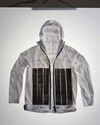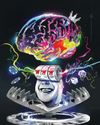
When you see photos from a modern telescope of a planet, nebula or distant galaxy, it's easy to be dazzled by the detail. But what astronomers get really excited about is a property of the light our eyes can't see: the spectrum. This secret code embedded in starlight can tell us not only what a celestial object is made of, but also the story of our cosmic past.
Back in the 18th century, scientists discovered that each substance produced its own pattern of colours when it was burning. It turns out that each element, when heated, emits light at certain colours specific to that substance.
These 'emission lines' show up as bright bands of colour when the light is spread out in a prism or diffraction grating, creating a telltale pattern that can be used to identify the substance. If you'd rather not set your sample on fire, you can also identify it by shining a white light through a gas of the stuff: you'll see the same pattern of lines, but this time in the form of dark gaps in the spectrum, known as 'absorption lines'.
In both cases, the lines are caused by electrons shifting between energy levels. Every element has a specific arrangement of levels its electrons can be in, which you can picture (somewhat inaccurately) as concentric orbits around the nucleus, with lower energies closer in and higher energies farther out.
この記事は BBC Science Focus の September 2024 版に掲載されています。
7 日間の Magzter GOLD 無料トライアルを開始して、何千もの厳選されたプレミアム ストーリー、9,000 以上の雑誌や新聞にアクセスしてください。
すでに購読者です ? サインイン
この記事は BBC Science Focus の September 2024 版に掲載されています。
7 日間の Magzter GOLD 無料トライアルを開始して、何千もの厳選されたプレミアム ストーリー、9,000 以上の雑誌や新聞にアクセスしてください。
すでに購読者です? サインイン

NOW YOU SEE ME, NOW YOU DON'T
Scientists around the world are working on ways to hide us from sight. But how close are we to developing tech that could make us invisible?

UNCORKED POTENTIAL
How much good can ditching drink for a month really do? Answer: a whole lot. In fact, science shows even short-term abstinence could unlock a cocktail of lasting benefits

Scientists discover when humans and dogs became friends
The relationship spans thousands of years, but experts might have pinpointed the first connection

Why it's so hard to kick a gambling addiction
We now know that gambling can be as addictive as drugs, but there are factors that can make it even harder to quit

How much could Ozempic change our world?
The weight-loss drug has made headlines and broken sales records, but what does it mean for our future?

WHY DOES DRINKING ALCOHOL MAKE IT SO MUCH HARDER TO LOSE WEIGHT?
While enjoying the occasional glass of wine or pint of beer may seem harmless, regular or excessive alcohol consumption can significantly hinder your weight-loss journey for a few reasons:

Why do so many New Year's resolutions fail?
Establishing positive new habits is hard at any time of year. But there are ways to stop your attempts ending in failure

'Extreme' solar radiation storm could hit Earth
Sun-like stars may have tantrums far more frequently than we thought

HOW CAN I BANISH THE JANUARY BLUES?
Dark mornings, long chilly evenings and short days; many people find January tough.

Neutrinos are getting in the way of dark matter detection
These troublesome particles are difficult to detect, but they're starting to show up in places where they're not wanted
